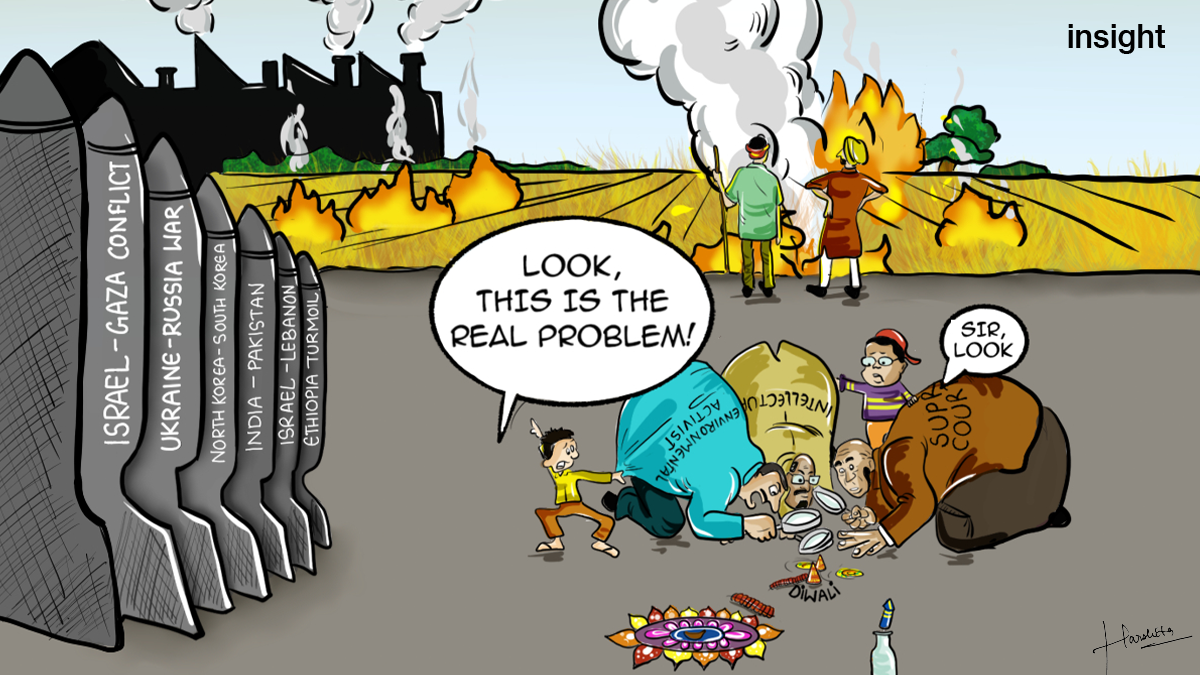Introduction
As winter approaches, a familiar scene unfolds: Bollywood celebrities, politicians, and governments suddenly turn their attention to the pressing issue of pollution, especially in cities like Delhi. Simultaneously, developed nations are quick to exert pressure on their developing counterparts to reduce carbon emissions. While these efforts are commendable, it is imperative to draw attention to the double standards that persist in both national and international communities regarding pollution control. This article aims to explore these “selective” approaches to pollution and to underscore the need for a more equitable and comprehensive outlook in our journey towards a green, sustainable, and eco-friendly world that strives for net zero emissions and combats climate change, global warming, and pollution.
Banning Firecrackers in Delhi: A Step Towards a Sustainable Future?
The recent decision by the Delhi government to ban firecrackers during Diwali, is a commendable step toward reducing the city’s carbon footprint and mitigating carbon emissions. Delhi’s Environment Minister, Gopal Rai, has highlighted the importance of this ban, citing a significant decline in PM 10 and PM 2.5 levels by 42% and 46%, respectively, from 2014 to 2023. While these reductions are indeed noteworthy, they fall short of achieving the desired air quality, especially during the harsh winter months. It raises the question: why is the focus solely on firecrackers during festivals, while other substantial contributors to pollution, such as stubble burning, receive less attention?
Stubble Burning: A Persistent Challenge in the Fight Against Pollution
Stubble burning remains a major source of atmospheric pollution in northern India. The Indo-Gangetic Plain, known for its rice-wheat rotation system, generates substantial stubble that is often set ablaze, releasing harmful pollutants. States like Haryana and Punjab, which play a pivotal role in agriculture, are significant contributors to this practice. Farmers resort to burning stubble to prepare their fields for the next planting season within a limited time frame. Paradoxically, while the emissions from firecrackers during Diwali attract criticism, stubble burning continues as a persistent and unaddressed problem. This apparent double standard is evident in the selective focus on one form of pollution while ignoring another.
Global Hypocrisy in Pollution Control: A Challenge in the Fight Against Climate Change
The international community’s approach to pollution control exhibits a similar double standard. While there is a global push to reduce carbon emissions and combat climate change and global warming, it is disheartening to witness the silence surrounding emissions resulting from geopolitical conflicts. Two prime examples of this double standard are the Russia-Ukraine war and the Israel-Hamas conflict.
The Russia-Ukraine war has resulted in extensive deforestation in Ukraine and significant damage to the country’s renewable energy systems, hindering efforts to achieve a more green and sustainable future. Surprisingly, the international community seems to conveniently ignore the carbon emissions resulting from these conflicts. The war has also led to a substantial increase in forest fires, releasing vast amounts of CO2 into the atmosphere. Furthermore, the disruption of energy supplies in the region has slowed future carbon sequestration efforts.
This selective approach to pollution control extends to the military sector. While the 2015 Paris Agreement requires nations to disclose and reduce their national emissions in the quest for net zero, military emissions abroad are exempt from reporting. These military emissions, both direct and indirect, could account for as much as 5.5% of total global emissions. This oversight is a significant double standard in the fight against climate change. The conflict in Ukraine has directly resulted in the release of 33 million tons of greenhouse gases, a figure that cannot be ignored.
The Environmental Consequences of Warfare: An Obstacle in Achieving Net Zero Emissions
A report titled “Climate Damage Caused By Russia’s War in Ukraine,” funded by the European Climate Foundation and the Environmental Policy and Advocacy Initiative in Ukraine, warned of a net increase of 120 million tonnes of greenhouse gases in the first 12 months of the war, equivalent to the annual output of a country like Belgium. This report, due to be released on the sidelines of the U.N. climate summit in Bonn, emphasises that it’s not only the warfare itself contributing to emissions but also the future reconstruction of destroyed infrastructure, which will have long-term implications in achieving a green, sustainable, and eco-friendly world.
Global leaders will converge at the COP-28 climate summit in Dubai this November to assess progress against climate goals agreed upon in the 2015 Paris Agreement. It is essential to include military emissions in these assessments, as they can account for as much as 5.5% of total global emissions. This inclusive approach is crucial for achieving global climate goals and ensuring that military emissions are addressed on the path to net zero emissions.
The Israel-Hamas Conflict and Energy Choices: Towards a Sustainable Future
The ongoing war between Israel and Hamas is expected to have significant environmental consequences. The head of the International Energy Agency (IEA) notes that geopolitical events are impacting the availability and prices of oil and natural gas, which are critical to our quest for a more sustainable, eco-friendly energy mix. The conflict in the Middle East has the potential to disrupt trade routes, leading to higher and more volatile energy prices. This could adversely affect economic growth, particularly in developing countries, emphasising the need for a green, sustainable energy transition.
The IEA emphasises the need for countries and consumers to shift toward cleaner energy sources, recognizing the fragility and geopolitical uncertainties associated with oil supplies. According to the IEA’s annual report, under current policies, global demand for coal, oil, and natural gas will peak this decade, with the share of fossil fuels in the global energy mix falling to 73% by 2030. This transition is vital in our fight against pollution, climate change, and global warming, moving us closer to a green, sustainable, and net-zero future.
The United States and Its Role in Achieving Sustainability
The United States, often seen as a global leader, is not exempt from scrutiny. The U.S. military’s war-related activities abroad between 2001 and 2018 caused 440 million tonnes of emissions, according to the Costs of War project at Brown University. Additionally, during the 1990-91 Gulf War, about 133 million tonnes of emissions were released when Iraq set fire to hundreds of oil wells as it retreated from Kuwait, as reported by the International Institute for Applied Systems Analysis.
It is worth considering that the United States, now an advocate for global climate goals, underwent a period of significant energy and resource consumption during the 1990s. This history raises questions about whether a nation that has already consumed vast natural resources in the past should ask developing nations to limit their own consumption on the path to a green, sustainable future.
Conclusion
The battle against pollution and climate change is a global effort, and it demands consistent and equitable actions. While efforts to reduce pollution, such as banning firecrackers and addressing stubble burning, are vital, it’s crucial to maintain a balanced perspective and address all sources of pollution with equal concern on the journey to a green, sustainable, and eco-friendly world that strives for net zero emissions and combats climate change, global warming, and pollution.
National and international communities must be more proactive in acknowledging and confronting pollution, regardless of its origin. This includes taking a hard look at the environmental consequences of conflicts and military activities, which are often underestimated or overlooked.


 Entertainment2 years ago
Entertainment2 years ago
 Entertainment9 months ago
Entertainment9 months ago
 Exclusive2 years ago
Exclusive2 years ago
 Entertainment2 years ago
Entertainment2 years ago
 Exclusive12 months ago
Exclusive12 months ago
 Exclusive2 years ago
Exclusive2 years ago
 World2 years ago
World2 years ago
 National2 years ago
National2 years ago




Gaurav
28/10/2023 at 6:30 PM
A very thoughtful and thought-provoking read.
Kudos to the Writer!